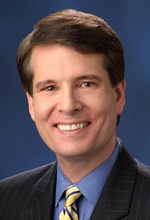Pharma execs have faced pricing questions from all sides at the J.P. Morgan Healthcare Conference this week. Gilead Sciences ($GILD) faced the brunt of public anger about expensive drugs: Protesters crashed a panel session headlined by President John Milligan and EVP Gregg Alton, and demanded to know how he could sleep at night, given the cost of Gilead's hepatitis C drugs.
"I sleep quite well," Alton said, and went on to defend Sovaldi, Harvoni and the rest of Gilead's hep C drugs, which it spent billions to develop and now qualify as true treatment breakthroughs.
The exchange, first reported by STAT, exemplifies the problem with today's pricing debate: Critics conflate effective, innovative drugs like Gilead's with meds that were cheap until hawk-eyed drugmakers scooped them up and jacked up their prices 5, 10 or 500-fold.
The public doesn't understand drug pricing at all; admittedly, it's complex, not to mention deliberately opaque. Politicians should know better, and though some have drawn distinctions between innovative drugs on one side and opportunistic pricing on the other, their public statements too often confuse the two.
 |
| Ron Cohen |
It's no wonder that pharma types are frustrated, to the point where BIO chairman Ron Cohen called the debate "an abomination" at the J.P. Morgan meeting. But wholesale dismissal of public concern isn't the answer. There are legitimate gripes about drug pricing, and not just among the Martin Shkrelis and Valeants of the world.
Bayer's new U.S. pharma president says the industry needs to start telling a new story about drug pricing--one that includes some more information about how drugmakers develop new treatments and decide on their prices.
Calling Shkreli "the guy who shall remain nameless" in an interview with the San Francisco Chronicle--in a perhaps unintended echo of archvillain Voldemort in the Harry Potter series--Bayer's Habib Dable said he and others like him don't recognize the value of R&D and aren't representative of Big Pharma as a whole, a sentiment that industry CEOs have been repeating all week.
But companies such as Pfizer ($PFE) and Eli Lilly & Co. ($LLY) continue to defend their price increases by saying list prices don't reflect discounts and rebates--without disclosing what those discounts and rebates are. "Some of the noise you hear about drug pricing neglects the fact that we often must pay deep discounts in a market-based environment, where we're competing in many cases against other alternative therapies, including those low-cost generics," Lilly CEO John Lechleiter said Monday on CNBC's "Squawk on the Street."
Meanwhile, California legislators are trying to push through a bill that would require transparency about R&D and pricing decisions, and drugmakers are, of course, lobbying against it. The bill does have its flaws, but stonewalling just looks bad. And on another note, drugmakers do continue to slap high prices on drugs that, unlike the breakthrough hep C generation, don't advance treatment much. Cancer drugs in particular.
Dable figures that revealing more, not less, could help matters. For instance, companies might talk about their spending on drugs that ultimately failed, as embarrassing as that might be. Offering examples of all the ways drugmakers invest in drug development, rather than expecting the public to simply buy into their oft-quoted stats, might open some eyes: "I'm convinced that if we explain with a little more transparency (the added value that) pharma firms are bringing to patients and the lessons learned from the drugs that never made it to the market, public opinion will be better swayed."
- see the Chronicle piece
- get more from STAT
- read the Modern Medicine story
Special Reports: 10 big brands keep pumping out big bucks, with a little help from price hikes | The top 10 most expensive drugs of 2013